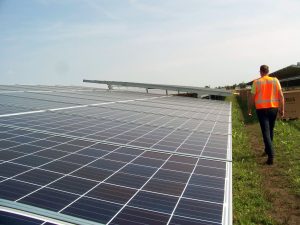The main 4 types of solar panels
Types of solar panels
Sorts of solar panels
You have several types of solar panels, all different types, sizes and brands. The type of panel is mainly determined by the material the solar cells are made of. We describe the four best known types on this page:
- Monocrystalline

- Polycrystalline
- Thin film
- Glass panels
Monocrystalline solar panels
These panels are often identified by their black color. A special manufacturing process is required to produce the solar cells for monocrystalline panels. As a result, although the cost is higher, the panels last longer with a relatively high efficiency of 20 percent or more. For the current cost of these and other types of solar panels, request here free and easy quotes.
Polycrystalline solar panels
Polycrystalline panels can be recognized by their blue color. The purchase price is lower than monocrystalline panels, as is the efficiency. Do you have a lot of roof area? Then choosing polycrystalline can be a good choice.
Thin-film solar panels
Thin-film panels are composed of thin layers of solar cells. Feature of these panels is that they are flexible and lightweight. Thin-film panels have the advantage of having less drop in yield when there is partial shadow. They are widely used on curved surfaces and are lightweight.
Glas-glas zonnepanelen
New are the glass-glass solar panels. Instead of a plastic film on the back of the panel, this type of solar panel has glass on the back. This means that the influence of moisture and temperature fluctuations on the panel is much smaller than with the glass-film panels. The solar cells are therefore safely sandwiched between 2 sheets of glass.
Over the years, glass-film panels sometimes allow moisture to pass through the film. And moisture in solar panels is not a good combination. To prevent glass-glass panels from becoming unmanageably heavy, they are made from much thinner glass than traditional panels. The glass used for glass-glass panels is safety glass of only 2 mm. This is in contrast to the glass used in the glass-film panels which is up to 4 mm thick.
Glass-glass solar panels last up to 33% longer and the yield is 25% higher than the most common solar panels in use today. In glass-glass solar panels we see product and power warranties of 30 years.
The higher efficiency of this type of solar panels has several causes, but is largely due to the fact that the degradation of the yield after the 10th year is much lower than with the glass-film variants. The graph below from Solarwatt shows this more clearly.
Because glass-glass solar panels are more expensive to buy, a good calculation must be made in advance to determine whether this additional price is sufficiently compensated by the expected additional yield. Because they are now being produced in larger numbers you can expect prices to fall quickly, making them more interesting. Compare current prices? Ask here but a free quote.